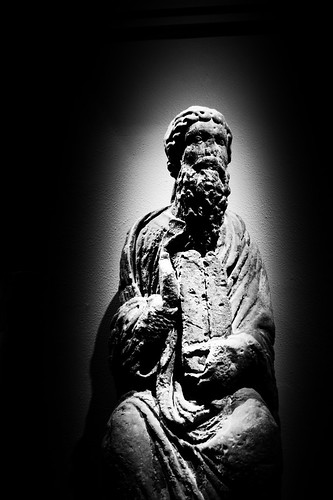
Moses with the Tablets, from France ca. 1170, in the Medieval collection of the Metropolitan Museum of Art. Photo by Rick Morley
The following is a reflection on Deuteronomy 34:1-12, the Hebrew Bible lesson appointed for October 23rd, 2011 according to the New Revised Common Lectionary. (Proper 25, Year A) On this site there is also
• a reflection on the Gospel Lesson for the same day, and
• a version of the Prayers of the People, based on the lessons of the day.
When someone great dies–someone whose life altered the lives of countless others, and who changed the course of history in some way–we remember them. Sometimes we pause to mourn, sometimes we lay flowers or mementos in certain places, often times we tell stories about how they impacted us on a personal level.
We’ve done that most recently with the death of Steve Jobs. I have to say, when I saw that he had died (via Twitter, on my iPhone), I gasped. Wanting more information I ran downstairs to grab my iPad. I marveled that people were leaving flowers and mementos at Apple stores around the country.
What really struck me was the confluence of his death and the Occupy Wall Street movement. Here were myriad Americans loudly challenging corporate America on one hand, AND mourning a corporate CEO on the other. Would anyone mourn the death of a Bank CEO, or the chief executive of some other multinational in an even remotely similar way? Hardly.
What set Mr. Jobs apart from other CEO’s, was the way that he, and his vision, personally effected so many people on an intimate level. We remember our first iPod. Our first iPhone. And, even if we don’t own iStuff, it was his ideas and technology which made other platforms possible.
His vision and life effects us on a daily basis. Every time we pick up a phone, check our Facebook, or open a folder on our desktop (remember your desktop?), we have Steve Jobs and his vision to thank.
Moses didn’t invent the graphic interface or multitouch swiping (he was a fan of the “tablet,” though…), but he brought his people, the People of God, from the dark time of slavery to the land flowing with milk and honey. A land to call their own.
Every time the Children of Israel woke up and stepped outside, they had Moses to thank for their land, their homes, their pastures and farmland, and their freedom.
His life was a game changer.
And, Moses didn’t even get to enjoy the land of freedom for a moment. He brought his people to the brink, and then died within sight of it.
Deuteronomy 34 tells us that Moses was one hundred twenty years old when he died. We know from other biblical data that he was forty years old when he left Egypt the first time, after killing an Egyptian. And, therefore, we also know that he had spent another forty years in Midian as a…shepherd.
At eighty years old then, he hadn’t accomplished much. He was probably ready to pack it in, and live out the rest of his years as a shepherd. But, even at eighty, God can still call us to do a new thing.
A new HUGE thing. A history altering thing.
A new thing like…go and lobby the most powerful human being on the planet to release his slave labor. And then, after engineering that miraculous escape, he had the job of shepherding people (not sheep this time) for forty years in the wilderness.
If he had retired at eighty, he would have lived a full-life, but we’d never have heard of him. It was what he did with his last forty years which marked him as one of the greatest humans ever to live. He brought freedom to the oppressed, and brought a homeland to the homeless.
And, after heeding God’s call, he never walked the land he was leading his people to.
But, it’s him we remember. And, it’s God we have to thank.
1 Comment